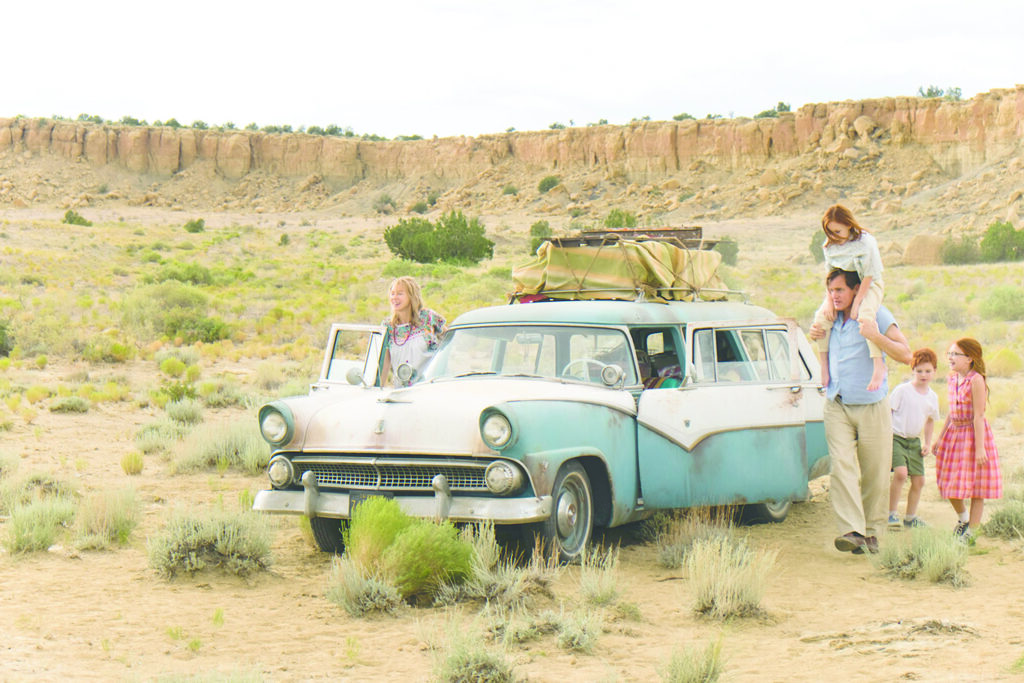
I was literally burning on the inside. My shoes were begging me to take them off and throw them at the movie screen, but that’s just not the polite thing to do. Plus, I probably couldn’t throw far enough, seeing as I was sitting in the second to last row of the theater.
“What is wrong with you?” my husband asked as I writhed in pain.
“What is wrong?” I thought. “Let me tell you what’s wrong. Jeannette Wall’s memoir, ‘The Glass Castle’ that chronicles her life filled with abuse and neglect has been Hollywoodized.”
Yes, Hollywoodized.
The Oxford Dictionary defines the word as, “to adapt (a story or series of events) so as to conform to the supposed norms of a typical Hollywood film, especially in respect of being unrealistically glamorous, exciting, or simplistic.”
Sitting in the movie theater, watching the book nearest and dearest to my heart — a book recalling dark pain — be romanticized, tore me to shreds.
And I’m not talking about the kind of disappointment you feel when a director forgets your favorite line from a book or the when the setting doesn’t play out the way you anticipated.
No, I’m talking about moral heartache. The kind where you question everything wrong in society.
Published in 2005 by journalist Jeannette Walls, “The Glass Castle” rose to The New York Times Best Seller List. Through her stories, Walls recounts her chaotic childhood in stomach-churning honesty. Hollywood, on the other hand, recounts Walls’ stories in feel-good-leave-the-theater-skipping dramatization.
The movie glorifies Walls’ father Rex, as a loving family man who sometimes makes a mistake or two, instead of a selfish, abusive alcoholic who, once in a blue moon, sobers up and doesn’t make his children’s lives a living hell.
The movie’s overarching theme is, despite the hardships Walls and her siblings endured, their crazy parents made their lives pretty fantastic.
Wait, what? You mean the parents who forgot to feed them, leaving them for days without food? Didn’t pay bills, which meant no running water, no electricity? The parents who dragged their family across the country over and over because they were either running away from debt collectors or social services?
Yeah, Hollywood, go ahead and tell your audience it’s okay for parents to behave like that. Go ahead and tell children who are suffering from abuse and neglect maybe their lives really aren’t that hard.
And of course, in Hollywood fashion, the Walls children, despite their beyond-dismal conditions, had beautiful teeth, hair and skin.
There was no mention of the constant bullying they suffered, no scenes showing their insecurity at their grungy clothes or unkempt appearances. Mostly because, well, they were all made out to be Hollywood beautiful.
It’s not even the perfect hair, or gorgeous skin or wonderful teeth that bothered me the most. What disgusted every fiber of my being was thinking about other children who are being abused, and the message this movie sends to them.
How could anyone walk away from the film without seeing an amazing family, which went through a few hard times together? How could a viewer interpret anything besides the fact that the abuse Walls and her siblings suffered was whimsical and, truth be told, rather adventurous?
The National Children’s Alliance reported that in 2015, 1,670 children died because of abuse and neglect. The same report also stated that 700,000 children are abused annually.
1,670 children died as a result of abuse. Every time I read that statistic I try to understand, but I just can’t. That’s 1,670 unwarranted, unjustified, inhumane, monstorous deaths.
The director of “The Glass Castle” had an opportunity to shed a light on abuse and neglect, and frankly, they blew it.
Thelma Adams of the New York Observer writes, “There are heart-tugging moments in The Glass Castle, but Walls’s bestselling memoir needed to be roughed up and aired out. For it to match up to the book, the movie needed the glass to be smashed, not every shard treasured.”
Don’t get me wrong, Walls did triumph over the adversities that relentlessly consumed her childhood. Her ability to forgive and connect with her parents despite her upbringing is powerful.
But forgiveness does not mitigate, nor rectify, wrongs that have already been committed.














JlM • Dec 29, 2020 at 8:04 am
Thank you . I had the same reaction
B. Brockamp • Aug 23, 2019 at 5:27 am
Thank you for speaking the truth. Glorifying abuse and neglect is outrageous.